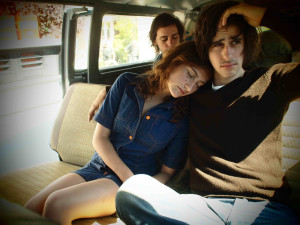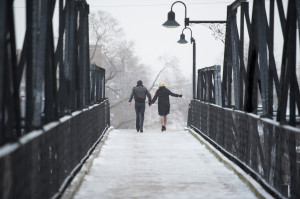
Three of the best films at this year’s San Francisco International Film Festival–“Something in the Air,” “Before Midnight” and “Stories We Tell” –are as much about their direct subject matter as the nature of storytelling itself: how our own personal mythologies shape our experiences and mold or corrupt our memories.
Olivier Assayas’ autobiographical film, “Something in the Air” is as much about the student protests against the bourgeoisie in 1971 Paris as it is about how the adolescents’ viewpoint leaves them blind to their own hypocrisy: the film’s student protesters are themselves members of the bourgeoisie, and their parents are the ones bankrolling their revolutionary schemes. Assayas immerses us in the excitement, the terror and the exhilaration of the protests and organizing for political purposes, but he also views his characters from a distance. We see what the characters cannot–how misguided and idealistic they now are–because their own experiences are so conflated with their personal narrative of changing the world. “Something in the Air” is an imperfect film–it runs about 30 minutes too long and includes an esoteric and irrelevant sequence toward the end–but it is emotionally rousing and makes you question how age changes how you remember events.

In “Before Midnight,” the brilliant third installment in what is now the “Before…” series, director Richard Linklater and actors Julie Delpy and Ethan Hawke, who all co-wrote the screenplay, weave a complex meta-narrative about the stories the characters are telling themselves and the stories the previous films seemed to be telling us. Nine years ago in “Before Sunset,” we saw the couple reunite for the first time in nine years and revise their own versions of what had happened that night in Vienna in “Before Sunrise” when they met. We meet the couple, Jesse and Celine, now in their 40s, on a pivotal and emotionally fraught day, as they struggle to reconcile their–as we do our–story of their own courtship from the first two films with the reality of a long-term relationship. “Before Midnight” is as much a slice-of-life film as its predecessors–it unfolds largely in real time, with the familiar long takes of uninterrupted intellectual and emotional conversation–but it’s deeper still, more mature, both because the characters have grown and because the film itself builds on and questions the events of the previous films.
Lastly, director Sarah Polley’s highly intelligent, perceptive and emotionally resonant documentary “Stories We Tell” takes the process of storytelling as its subject. Polley’s recent discovery that the father who raised her is not her biological father is the means of exploring this. Polley interviews family members, including her siblings, her father and her biological father, to get each of their own personal, and often conflicting, perspectives. This gives the appearance of objectivity, but the subjects are all somewhat unreliable narrators: the story of the past is conflated with their own personal narratives. The interviews are interspersed with footage from home videos as well as re-enactments by present-day actors, which flow together so seamlessly that it can be difficult to tell what is footage of record and what is imagined, directed and assembled by Polley. The form the film presents it in has been edited and assembled in the way that Polley wishes to tell the tale, which ultimately gives us her own subjective version.
“Something in the Air,” “Before Midnight” and “Stories We Tell” are all excellent must-see films at this year’s festival that, taken together, are a fascinating exploration of the how and why of personal narratives.
“Something in the Air” screens April 27 at 6:30 p.m. (at rush) and April 29 at 9:15 p.m. at the Sundance Kabuki. “Before Midnight” is the closing night film May 9 at 7 p.m., with guests Linklater and Delpy. “Stories We Tell” screens April 29 at 6:15 p.m. and April 30 at 1:30 p.m. at the Sundance Kabuki, and Polley is expected to attend.